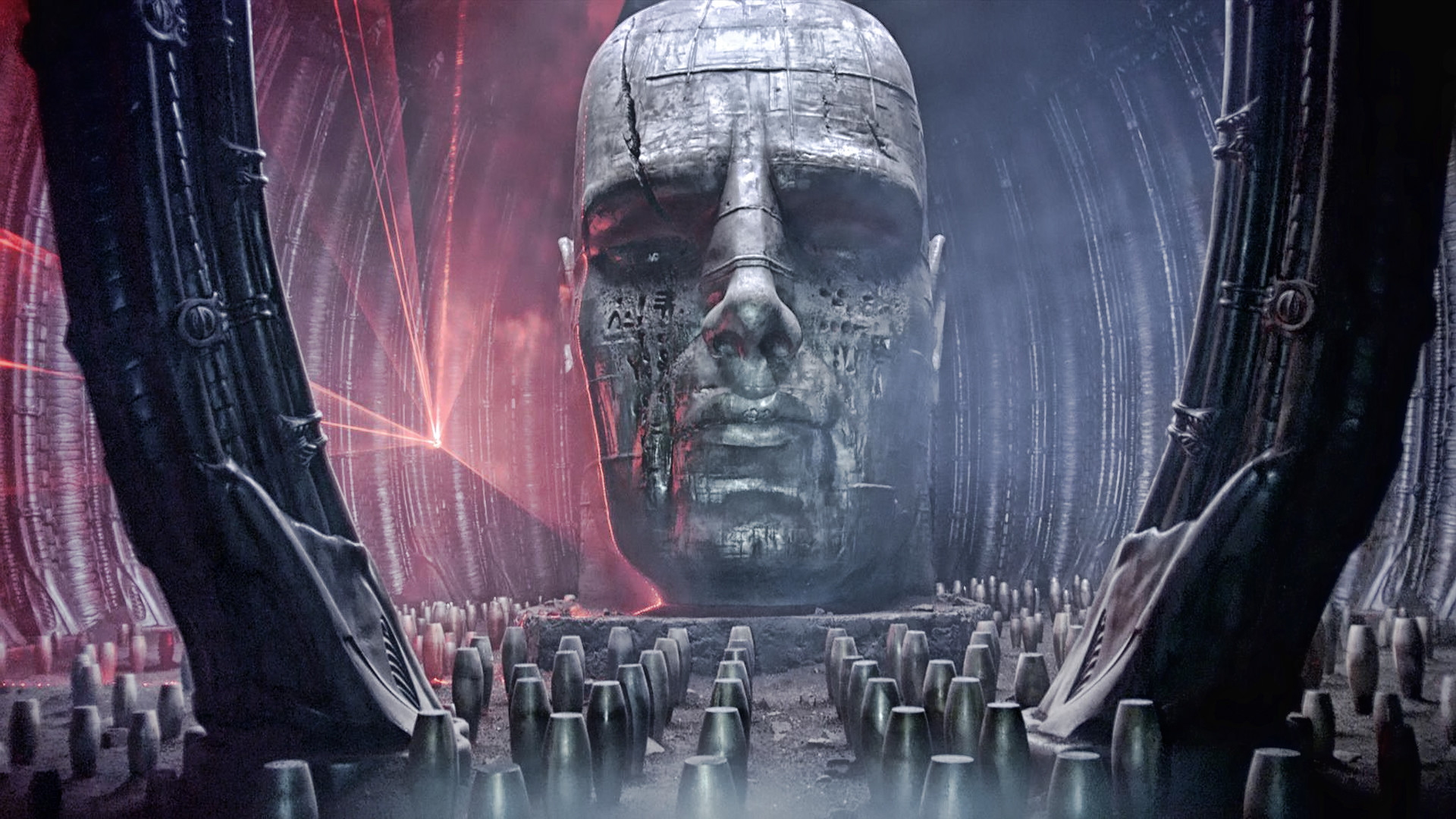There are two distinct ways in which we can relate to the ‘movement away from the known’ – one is to find it tremendously exciting and endlessly interesting, and the other – of course – is to find it utterly terrifying! So terrifying do we usually find it that we actually deny (implicitly rather than explicitly) that there is such a thing. Naturally enough, if the only way we have of relating to the movement away from the known is one of utter terror, then we would much prefer not to relate to it at all! That’s the way fear works, after all – if we’re afraid of something enough then we turn a blind eye to it.
As a collective, we don’t admit that there is such a thing as this movement. We don’t acknowledge that there is such a thing as the ‘radical unknown’ so how can we acknowledge that they could be such any such a thing as a movement in this direction? When the radical unknown is denied then what we have as a result is a closed situation (or a closed system), and two good examples of the closed system are the ‘rational mind’ and ‘the socially-constructed reality’. Or we could lump them both together and say that good example of a closed system is the rational mind and the logical world that it automatically creates. A system that is closed is characterised as such because nothing new ever happens in it. Everything that happens in a closed system has been ‘decided in advance’ in other words, and because everything has been decided in advance there can obviously be no such thing as ‘the movement away from the known’!
The world that we know and are so very familiar with (the world that we live in and implicitly understand to be ‘the only world there is’) is a world in which there is no such thing as the movement away from the known. We have no concept for it (and even if we did have a concept for it that would be no good since having a concept for the radical unknown would straightaway bring us back into the realm of the known). This is not to say however that we don’t ever have experiences of fluctuations away from the ‘baseline of normality’ because of course we do – these are moments when the world seems to be strange or unfamiliar to us, and unaccountably different to the way we had always comfortably assumed it to be. We all know this kind of thing, of course. When we get experiences like this then the ‘strangeness content’ of the world suddenly increases, and we sense this change very acutely. We don’t know anything about the strangeness, we just know that it is strange.
We might all know this type of thing very well but at the same time we also have the ability (the well-exercised ability) to forget about it very quickly and re-engage with ‘normal reality’ again as if nothing had ever happened. We jump over the cracks in our reality, as Sogyal Rinpoche says. Normal everyday reality (which is ‘the Realm of the Known’) acts very much as an anaesthetic in this regard – it’s the same sort of thing as trying to remember a dream when we have re-entered waking consciousness again. Dreams cannot be brought into everyday reality. The closed system has no reference for anything that isn’t closed after all, and so the notion that they could be anything else simply doesn’t arise. Similarly, our experience of the extraordinary is very quickly denied, as we have just. In a closed world only the boring old regular stuff is allowed – all other possibilities are squashed. In the aftermath of an experience of something extraordinary happening it is as if we are surrounded by an army of die-hard cynics, each one of them “That could never happen, that could never happen, that could never happen). In the face of such overbearing, wall-to-wall cynicism it is almost inevitable that we are going to succumb to it.
In the closed world, then, there is no such thing as ‘the movement away from the known’. Instead, there is only ‘an error that needs to be corrected’ and this isn’t the same thing at all, clearly! If something is an error then this makes it a known not an unknown – we know that it doesn’t matter, we know that it’s just ‘a bug that needs fixing’. This then excludes the radical unknown in a remarkably thorough way; if the movement away from the known is automatically seen as ‘an error in the system that needs to be corrected’ then there is no movement away from the known. This situation that we are calling ‘the closed world’ isn’t anything unusual or exotic either – it is the so-called ‘reality’ with which we are presented every day.
This brings us back to what we started off this discussion by saying, which is that we have two very different ways of relating to the movement out of equilibrium – we respond with either with very great fear or with very great delight. We now had to revise this statements somewhat; we have to revise it because we very rarely come across this movement, and if we don’t come across it then how can we relate to it at all, with fear or otherwise? Clearly we have no relationship with ‘the movement away from the known’ – as far as we’re concerned there’s no such thing. Just because we have denied something doesn’t mean that it’s gone away however; all that we’ve really gotten rid of is our awareness of the thing. Far from ‘going away’, what we have denied now has absolute power over us. What we deny rules us, after all!
It’s not that ‘the movement away from the known’ rules us (how could it do that?) but our fear of that movement. Our ‘relationship’ (so to speak) with this fear is that it ‘rules us’, and so what we’re talking about isn’t really a relationship at all. It’s something else entirely – what we talking about here is determinism, pure and simple; what we looking at here is Philip K Dick’s ‘Lower Realm’ – the realm in which everything we do and think as a result of us being acted upon by mechanical forces. There is always been a lot of philosophical waffle going on regarding ‘free will’ (or the lack of it) in this world; the argument has become all but meaningless at this stage. It is – as everyone knows – it’s a bit of a ‘hoary old chestnut’ and – as such – it is pretty much bad form to bring it up in polite conversation. What we’re talking about here isn’t anything to do with this old argument however – it’s not a question of ‘believing that we have free will’ or ‘believing that we have no free will’, the type of determinism we’re talking about is something that we can actually see. We can – if we examine the matter as we just have done – straightaway see that when we deny ‘our fear of the movement away from the known’ then the only possible result of this will be that we will be controlled by the fear that we have denied. This isn’t some sort of interminable ‘philosophical wrangle’ just a simple observation. This is psychology we’re talking about not philosophy!
The ‘observation’ that we talking about here is both simple and undeniably elegant to contemplate – when we deny that there is any such thing as ‘the movement away from the known’ (as we do deny) then we are – needless to say – stuck in ‘the world of the known’ and the problem with this is that ‘the world of the known’ doesn’t really exist. It’s more than just a little bit absurd that we are so convinced that it does exist – the ‘world of the known’ is only our own descriptions, after all – it’s a ‘world’ that is made up entirely of our judgements, made up entirely our evaluations, made up entirely of our thoughts. The only thing that is actually real is the movement away from the known that movement (which Heraclitus calls flux and David Bohm calls the Holomovement) is the only ‘thing’ that there is – there is no ‘non-movement’, there is no ‘World of the Known’.
The movement away from the known is just another way of talking about the movement into freedom – that’s the only thing it could be. The movement into the unknown is nothing other than freedom itself; there is no other type. The movement out of definition is the movement into freedom because definition works by taking freedom away. There can hardly be said to be ‘freedom’ in the World of the Known (which is the world that exists in denial of the radical unknown), even though this is of course where we think it is to be found. Naturally we think that freedom is to be found in the World of the Known – that’s the only world we believe in. Of course we‘re looking for freedom in this realm (PKD’s Lower Realm) – where else would we look for it? If someone were to come along and suggest that there isn’t any freedom in this world of ours then that would come across as being very dour, in not nihilistic, whereas understanding that there is no freedom (or free will) in the rationally-constructed world is of course actually a remarkably helpful thing. We realize that we’ve been looking in the wrong place for freedom the whole time and this is of course a marvellous discovery – a whole new world of possibilities now opens up for us where we least expected to find it – the real world is to be found in what we have always written off as ‘error’…
Image credit – startplaying.games







Jaywalker
Hey Nick,
I think this is a fabulous piece that you ve touched upon. As i was nearing the end of the article, i was hoping you’ll say a lil more. 🙂
The point which resonated the most was the part where you say that we might be looking for freedom in the known world! And that’s not where we’ll find it.
As I’m about to ask you to elaborate on the unknown world, i wonder if you do, won’t it be unknown anymore or never has been?
I hope you understand what I’m trying to get at. Or am i confused about what you re trying to convey.
But i still would like you to consider an addendum to this post
Thanks
Sandeep
Nick Williams
Thanks Sandeep,
I would love to write on a follow-on piece to that – it’s only just very slightly scratching the surface anyway. Not that there is a surface of course – only the known has a surface, or rather the known IS a surface, a surface that doesn’t really exist. It comes down to what we mean by ‘known’ – we could say that it is the world that we conceptually understand, which means it is the world that is made up entirely of our own concepts.
Or we could say that the ‘known world’ is the world that we agree on collectively – we all agree that it is such and such and so then we get stuck in it because we can’t ever go beyond what was agreed on. if we did that then we’d be deviants, we’d be BREAKING the agreement as to what is real and what is not real.
That means that we can’t (obviously enough!) ever find freedom here, with all our social games, therefore.
And coming back to the other way of talking about the world of the known, we could say that when we perceive the real world we somehow go to sleep very quickly and think we know what it is. We stop paying attention to reality and take notice of our assumptions about it instead and then try to find freedom in the tangled web of our half-baked assumptions, as if it were going to be here…
I will definitely try to do a follow-up to that though, and any comments will be gratefully received…
Nick Williams
This is a relevant quote on deviance, I think – https://nick251260.wordpress.com/2020/02/05/deviance/
Nick Williams
This is the ‘addendum’ – https://www.thenegativepsychologist.com/looking-for-freedom-in-the-wrong-place/?fbclid=IwAR0Jtg6reLGtOgI0eptw-HBinUflzzdjJFurJ2t8zb39Z6VSAnNUGuKdkTA